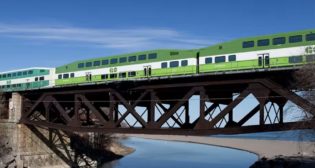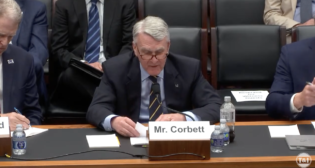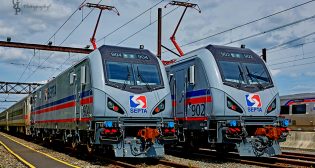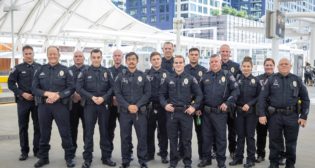
Transit Briefs: Amtrak, NJ Transit, TriMet
Written by Marybeth Luczak, Executive Editor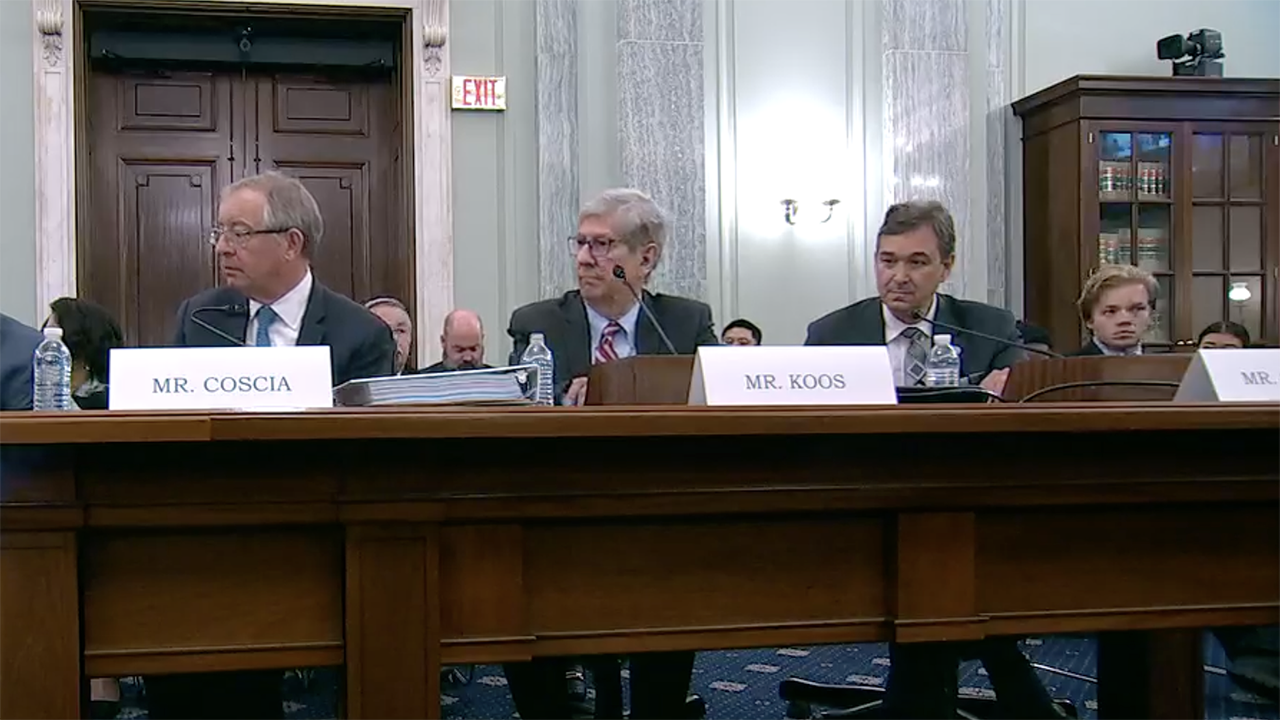
Anthony Coscia (left), Normal, Ill., Mayor Christopher Koos (center), and Joel Szabat (second from right) have been confirmed as members of the Amtrak Board of Directors, which sets policy and oversees the management and strategic direction of “America’s Railroad.” (Screen grab from video of U.S. Senate Commerce Committee nomination hearing held June 23, 2023)
The U.S. Senate confirms the nominations for three Amtrak Board members. Also, New Jersey Transit plans a systemwide fare increase, the first since 2015; and Tri-County Metropolitan Transportation District of Oregon (TriMet) proposes replacing late-night MAX light rail with buses and streamlining MAX stations in downtown Portland to speed service.
Amtrak
Christopher Koos, Anthony Coscia and Joel Szabat are confirmed members of the Amtrak Board of Directors, which sets policy and oversees the management and strategic direction of “America’s Railroad.” The U.S. Senate signed off on Jan. 23; it had not confirmed an Amtrak nominee since 2015.
President Joe Biden nominated Koos, Coscia (renomination) and Szabat in 2022. The Senate Committee on Commerce, Science and Transportation most recently held a nomination hearing June 21, 2023, and the nominees passed out of the Committee on Oct. 18, 2023. Koos and Coscia appeared twice before the Committee, with their first nomination hearing held on Sept. 7, 2022.
Coscia has served on the Amtrak Board since 2010 and has been Chair since 2013. His previous term expired in 2020, but Amtrak’s enabling statute allows Board members to continue serving until they or a successor is Senate-confirmed. Szabat spent 38 years in federal service. He was most recently U.S. Department of Transportation (USDOT) Deputy for Aviation and International Affairs. He had also served as USDOT’s Acting Under Secretary of Policy, representing former Secretary Elaine L. Chao on the Amtrak Board from June 2019 through January 2021. Koos, in addition to his position as Normal, Ill., Mayor, which he has held since 2003, is the U.S. Conference of Mayors’ Vice Chair for Passenger Rail.
Amtrak’s Board comprises 10 Directors. There are two ex officio members—Amtrak CEO Stephen J. Gardner, whose seat is non-voting, and Transportation Secretary Pete Buttigieg. The other eight members are appointed by the President and confirmed by the Senate for five-year terms.
“I applaud today’s [Jan. 23] confirmations of Mayor Christopher Koos, Anthony Coscia, and Joel Szabat and look forward to the work they will do to enhance the passenger experience and improve reliability,” said U.S. Sen. Maria Cantwell (D-Wash.), who is Commerce Committee Chair. “Amtrak’s service is essential for travelers all across the country and provides an economic boost to the rural and urban communities it serves, including along the Amtrak Cascades, Empire Builder, and Coast Starlight in the Pacific Northwest. As travel continues to rebound, the Bipartisan Infrastructure Law’s investments will allow Amtrak to purchase new railcars, improve stations, and upgrade tracks. The new Board members will help ensure these investments are spent wisely and benefit the entire nation.”
Further Reading:
NJ Transit
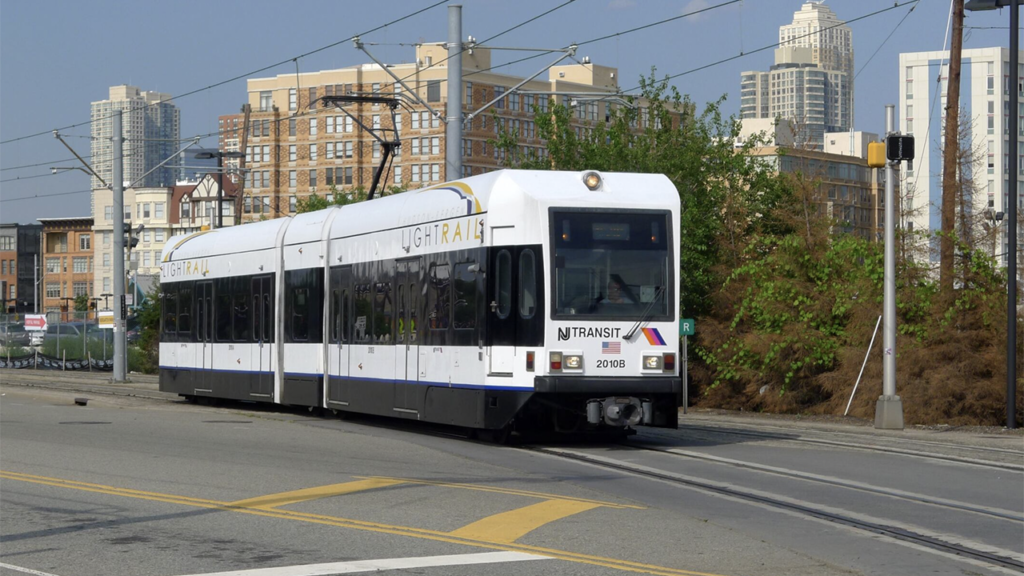
NJ Transit on Jan. 24 announced a planned 15% fare increase starting July 1, 2024, with an additional 3% annual increase thereafter. The move, along with the transit agency’s “internal efficiencies, savings and revenue enhancements” would allow for a fully funded FY 2025 operating budget that “avoids reducing service levels,” it said.
NJ Transit will hold 10 scheduled public hearings in 10 New Jersey counties, including both morning and evening sessions, beginning March 4 and running through March 8 before the plan is considered by the agency’s Board of Directors.
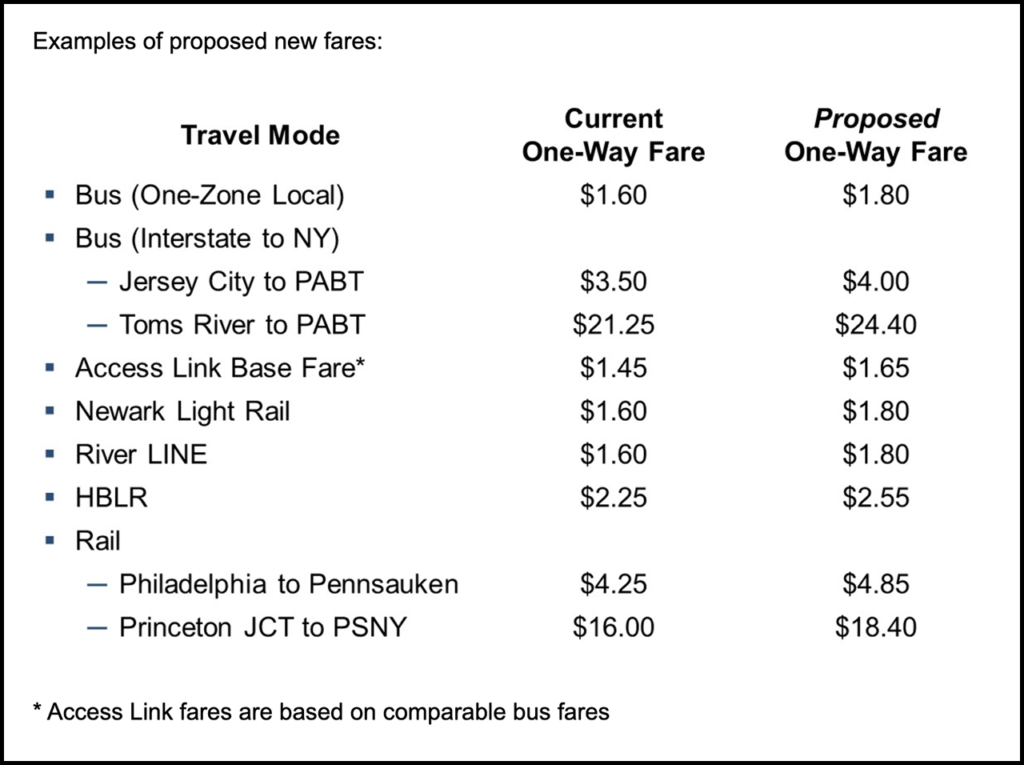
“Since 2015, NJ Transit has held the line on fare increases while not only improving service performance, but adding additional service on more than 100 bus routes and implementing substantial emergency service to support customers abandoned by multiple private bus carriers,” the transit agency said. “In addition, NJ Transit has improved the customer experience through a variety of enhancements since 2018, including fully restoring the ranks of locomotive engineers, delivering a highly rated and completely redesigned NJ Transit Mobile App, introducing new fare payment technologies, and graduating more than 2,300 new bus operators, along with numerous other improvements. NJ Transit has also introduced several improvements for its Access Link paratransit service customers. … And all of this while operating the system with the highest standards of safety and security, including meeting the federal requirements for Positive Train Control in 2020 and expanding the presence of New Jersey Transit Police Department officers throughout the system.”
Since the pandemic began, NJ Transit said ridership has returned to approximately 80% of pre-COVID levels, with many peak period trips “at or exceeding pre-pandemic levels.” However, it noted that it is entering the fifth consecutive year of ridership that will be below pre-COVID levels, which has resulted in a reduction of nearly $2 billion in farebox revenue. NJ Transit said it has used federal COVID relief funding over a multi-year period to maintain full service levels, but that funding will be exhausted in FY 2025, which runs from July 1, 2024, through June 30, 2025.
In July 2023, NJ Transit’s “very preliminary estimates” for FY 2025 identified a budget deficit of $119 million, it said. “As the budget projections have continued to be refined since that time, and as the federal COVID-relief funding will be exhausted in FY25, cost drivers have increased substantially,” according to the agency. In addition to an increase in inflation of more than 30% since 2015, which NJ Transit noted affects fuel costs and materials, other costs have also risen. According to the agency, they include: operational costs of more than $30 million associated with operating emergency bus service to replace multiple abandoned private carrier bus routes; NJ Transit’s contracted services, such as Access Link paratransit service, the River LINE and Hudson-Bergen Light Rail systems, and private bus carriers; contractual wage increases related to labor collective bargaining agreements covering approximately 10,000 of the 12,000-plus NJ Transit employees; and healthcare costs, which have risen nearly 47% during this period.
Through a combination of $44 million in cost reductions, along with an additional $52 million in revenue enhancements, NJ Transit said it is reducing the originally projected FY 2025 deficit and offsetting “some mandatory, non-discretionary cost escalations.” Included in the FY 2025 “revenue enhancements,” the agency said, are the proposed conclusion of the FLEXPASS pilot and the implementation of 30-day expiration dates on all one-way tickets. The systemwide fare adjustment would close the remaining budget gap of $106.6 million, allowing “for a fully funded FY 2025 operating budget that avoids reducing service levels,” NJ Transit said.
In a related development, the Middlesex County Improvement Authority, in partnership with NJ Transit and the New Jersey Department of Transportation, recently awarded a $7 million design contract to AECOM for the New Brunswick Train Station renovation project. Also, to learn more about why NJ Transit’s Hudson-Bergen Light Rail is a DBOM (Design-Build-Operate-Maintain) model deployment, read Railway Age Contributing Editor Alfred E. Fazio’s November 2023 report.
TriMet
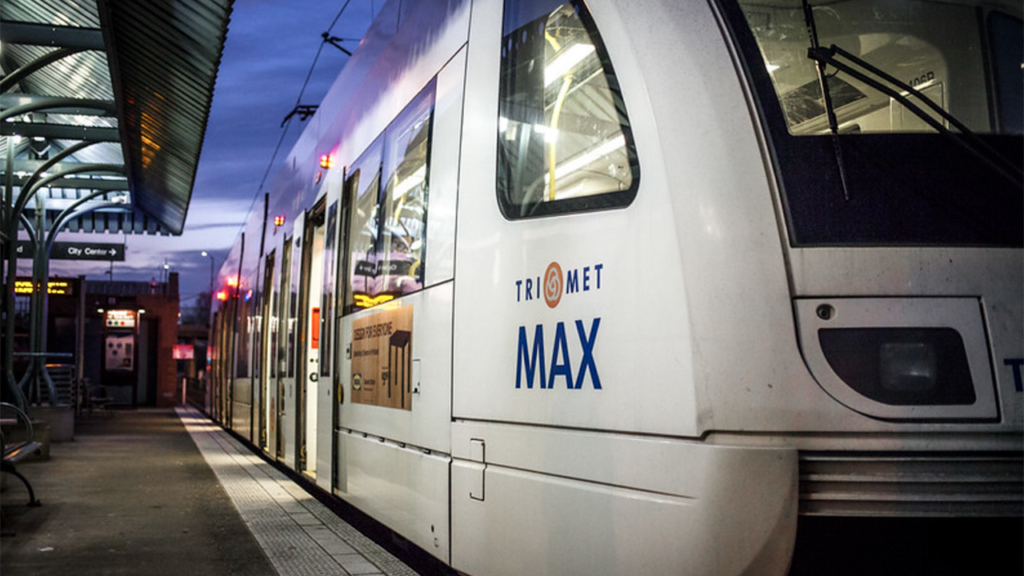
TriMet on Jan. 24 reported moving forward on two MAX service-improvement efforts. One is slated to speed up MAX Blue and Red Line trips through Downtown Portland. The other is expected to allow more overnight maintenance work to help reduce planned and unplanned disruptions to all MAX lines.
TriMet said it plans to establish a network of night buses in place of late-night MAX trains, expanding its Line 291-Orange Night Bus that has been in service since the MAX Orange Line opened in 2015. “Adding night buses across all MAX lines and moving late-night/early-morning MAX trips to those buses would allow for more overnight maintenance projects on the MAX system and reduce unplanned service disruptions, as well as multi-day disruptions for MAX improvement projects,” according to Trimet, which noted that it has the second-shortest overnight maintenance window of any U.S. transit agency that runs light rail service. “There are only 47 minutes in which no MAX trains are running anywhere on our 60-mile light rail alignment, drastically restricting what work can be completed overnight,” the agency said. “On average, transit agencies have a two-and-a-half-hour gap, with some agencies exceeding four hours. Long service hours also lead to excessive wear and tear on rails, track equipment, overhead wires and trains.”
TriMet noted that in a two-month period in late summer/early fall of 2023, just over 1,200 trips were taken across all MAX lines on average between midnight and the start of service shortly before 4 a.m. That compares with more than 70,400 trips taken between 4 a.m. and midnight.
The development of individual MAX night bus service hours, routing and schedules is still under way, TriMet said.
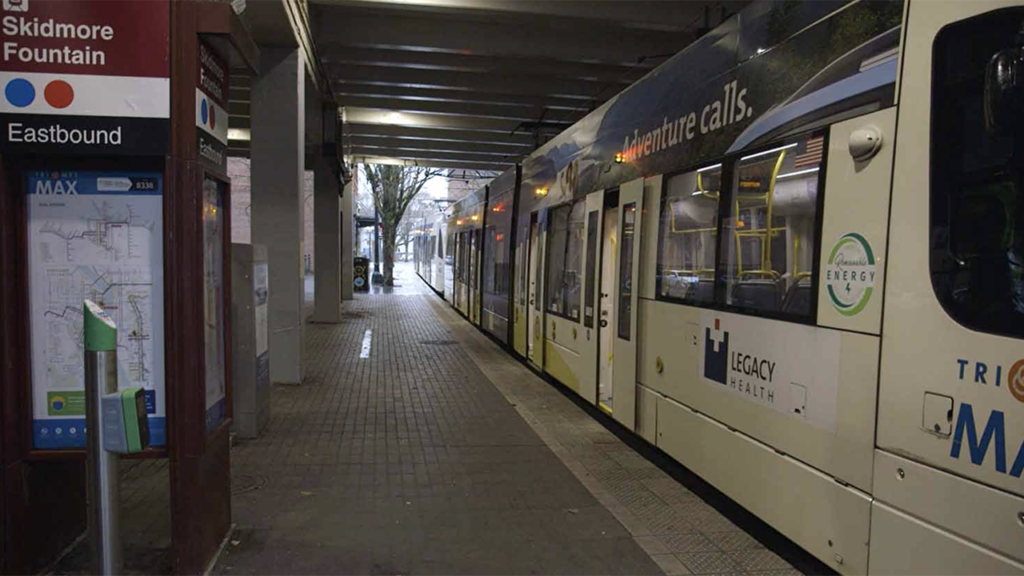
TriMet is also renewing plans to close in fall 2025 the Skidmore Fountain MAX Station, which it said would improve MAX trips through downtown Portland. The Skidmore Fountain Station was one of four stations that had been proposed for closure previously “to make trips faster and more efficient,” according to the agency. TriMet conducted outreach over 10 months in 2018 and 2019 before closing the other three stations—Kings Hill/SW Salmon, Mall/SW 4th Ave and Mall/SW 5th Ave MAX stations—in March 2020. TriMet said it made the decision to re-evaluate closing the Skidmore Fountain Station in the future if ridership did not increase there and development in the area did not occur. Those conditions have not been met, according to the agency.
The Skidmore Fountain Station is close to the Old Town/Chinatown Station, about two blocks, or 500 feet to the north, and the Oak/SW 1st Ave Station about four blocks to the south. With the three stations within a third of a mile, MAX Blue and Red Line start and stop several times, leading to slow trips along 1st Avenue, between the Steel Bridge and the SW Morrison Street/Yamhill Street couplet, TriMet said.
“Since TriMet closed the Kings Hill/SW Salmon, Mall/SW 4th Ave and Mall/SW 5th Ave MAX stations, MAX Blue and Red Line trips through Downtown Portland are a minute and a half faster each way,” the agency reported. “That adds up to about 46 hours and 38 minutes of travel time savings a week for thousands of riders. Closing the Skidmore Fountain Station is expected to reduce MAX trips by another 45 seconds in each direction.”
The TriMet Board is expected to consider the Skidmore Fountain Station closure and hold a public hearing in April, with a vote in May.
TriMet is in the midst of A Better Red, a multi-year project that kicked off in fall 2021 to extend the MAX Red Line west to Hillsboro and improve train movement through the Gateway Transit Center and at Portland International Airport. “Despite the recent weather challenges, the project remains on schedule to be fully completed this summer,” TriMet reported Jan. 22.
Last summer, crews added a second track near Portland International Airport and rebuilt the MAX station there. These enhancements opened in October, following 126 days of construction. On March 4, 2024, Red Line riders will experience a new inbound-only MAX station, dubbed Gateway North, along with new track and bridges to speed-up travel. The final phase of the project will be the Red Line extension 10 stations west to Fair Complex/Hillsboro Airport, which will open in August 2024.
